#the portrayal of longing
Explore tagged Tumblr posts
Text
how do i explain to people that yes, i studied literature, and yes, one of my favorite books is supernatural 90s horse-girl au fic “spirit of the west” by teen_dean
#guys#the way that hands represent pain and kindness#the ged as representative of physical and emotional freedom#the portrayal of longing#the use of the crossroads deal to show true desires (even though demons aren’t a part of this universe)#baking as a means of rebellion (but in a soft way)#what it means to know and to be known#spn#supernatural#dean winchester#spirit of the west#i think of teen dean’s spirit of the west regularly
52 notes
·
View notes
Text

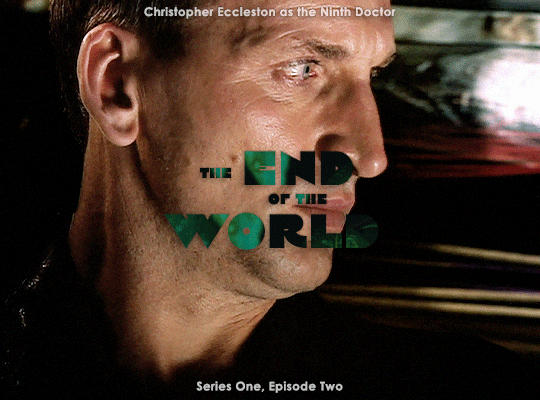


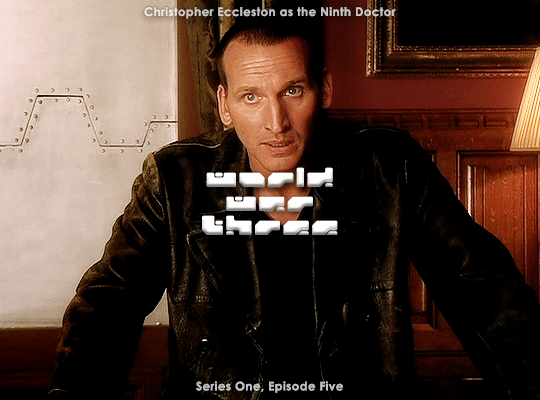
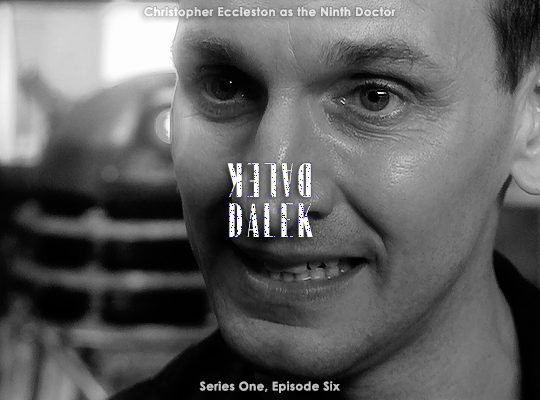




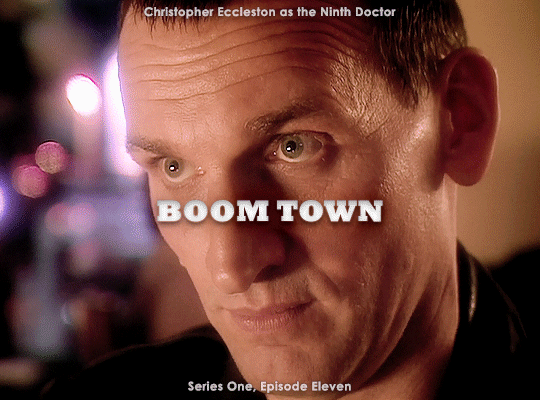
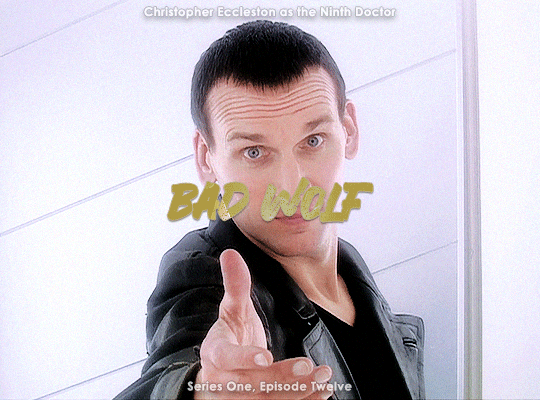
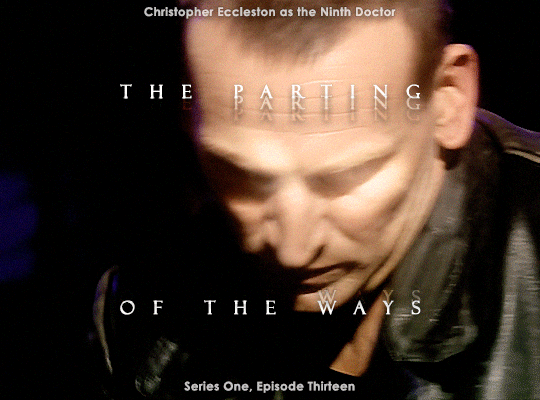
DOCTOR WHO series one ✧ 2005 — inspiration
christopher eccleston as the ninth doctor 🌌
#doctor who#ninth doctor#christopher eccleston#dwedit#dwgifs#tvedit#&.mine#tv: doctor who#this took so long but also was so much fun#had a fun groovy time playing with the lettering and the effects#alsoooo massive inspo from the linked set its soooo cool#i was just shooting my shot into the void making this one lol#....#can you tell i that i started getting super tired at the end (i did the last three at ass oclock in the morning D: its been days)#also i loved nines portrayal of the doctor i can't say that enough#he really ran with it and i respect that#i think if i stare at this for any longer i might delete it so im just gonna post lmao
1K notes
·
View notes
Text




Although very brief, I really really love the portrayal of Logan’s Weapon X breakout scene in X2. i love how it shows how nightmarishly awful this whole situation is for him. The fucking trauma of it all. His agonizing scream and the fact he looks absolutely horrified by the blood and the adamantium claws.
#forgive me yall idk how to make a gif. i just needed this for visual#i really just needed to gush about this scene#its maybe a solid 10 seconds long but it’s genuinely my favorite portrayal of weapon x#ik its also done in origins and apocalypse but i personally really love this one#x2 xmen united#x2#wolverine#logan howlett#james howlett#weapon x#xmen#x men
1K notes
·
View notes
Text
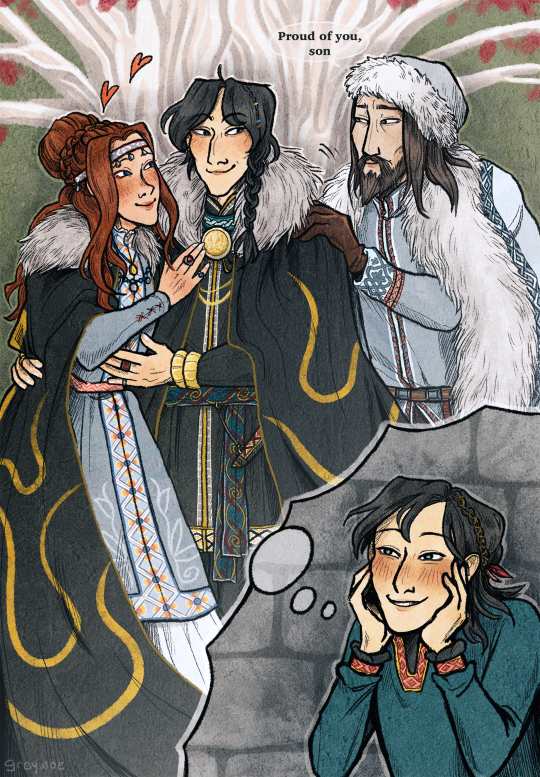

child ward in search of belonging indulges in juvenile fantasies as a coping mechanism. sad!
#my drawings#asoiaf#asoiaf fanart#theon greyjoy#not tagging the others bc they’re products of his imagination#so @ their fans: dw they’re not real…….#well i mean they’re not real anyway but as in a portrayal of their canon selves etc#this has been finished for so long but i debated whether or not to upload it here lol i’m not super happy w it#i think i did this mainly bc i wanted to draw fancy and ornate clothing (at least by my standards lol)#but it’s a quote i think abt sometimes bc it’s kind of endearing and sad and funny at the same time#adwd#well the quote is from there#also he’s yassifying himself a bit in his imagination… he’s handsome and successful and everyone admires him#and sansa’s kind of.. reduced to his prize in a way. while his focus is on ned welcoming him into the family#legitimacy and validation and safety 👍
1K notes
·
View notes
Note
What is your opinion of zoenette? Do you like the ship?
I'm not mad at it, but I'm not excited by it.
#zoe's feelings for marinette were probably the most healthy in their portrayal over EVERYone tbh#acknowledges herself but is also fully aware she has literally no shot and wasn't even going to bother confessing#aaand she seems to know marinette better than her long time friends just saying#transmission/deflagaration really wrote her as like the best supporting character tbh#and I can look back at her interactions with Marinette and conclusively figure out what she sees in her lol#which is MORE THAN SOME COUPLES-#so where I lack excitement is that I don't really see it on Marinette's side#like I see Marinette having more of a crush on Kagami than Zoe tbh#so it's mostly a one sided ship for me#ask zoe
298 notes
·
View notes
Text
Reading the novelization of A New Hope already changed how I saw Luke as a character but Splinter of the Mind’s Eye is going one step further and making me question the very fundamentals thought to be obvious about Luke.
Like, Luke is, for lack of a better term, a nerd. He studied languages and cultures -
“”Yes,” Luke admitted modestly. “I used to study a lot about certain worlds, back on my uncle’s farm on Tatooine. It was my only escape, and educational as well. This,” and he indicated the creature resting a massive long arm on his head and shaking him in a friendly fashion, “is a Yuzzem.””
-he wants to study more languages and cultures-
“Empty doorways beckoned to him and he was tempted, very tempted, to enter one of the ruined structures to find out if its interior was as well preserved as the outside.
This was not, he reminded himself firmly, the time for playful exploration. Their first concern was to find a way out, not to go poking around this ancient metropolis. However wonderful it was.”
Luke wants to know about people. He wants to know about cultures and creatures and he wants to be able to communicate and…
He really just. Is a great Jedi. He jumps between Leia and danger and he befriends the Yuzzem the prison guards thought would kill him and he wants to explore the creepy abandoned ruins of a civilization long past and he uses Anakin’s lightsaber underwater to cut the stem of a lilypad they use as a boat and he comments that the rock formations are almost too beautiful to cut down and he knows how to work Imperial explosives and
He’s a Jedi, man. He’s a Jedi. He’s been a Jedi this whole time, before any of us even knew what that actually meant.
#the inane ramblings of a madman#star wars#luke skywalker#long post#splinter of the mind’s eye#sw novels#listen listen listen#i’m like ninety nine percent sure most of this book is canon to legends’#and like#later portrayals of luke have to be based on this one#he wants to learn and he wants to communicate with people#also the language of the yuzzem is mostly grunts and growls and chitters#so i have to assume luke could also speak shyriiwook if he wanted#luke in the christmas special understanding what chewie and his family’s saying#is made all the funnier with knowledge of other languages luke has learned#i’m rethinking how i’ve been writing and interpreting luke this whole time#he’s a massive nerd and i never even truly understood the extent of it#tragic
499 notes
·
View notes
Text
toshiro/shuro is honestly an ok guy from an objective point of view, but man does he have SO MANY things working against him from an audience POV its honestly comedic.
he has little spine and even littler communication skills making him every neurodivergents nightmare, he's straight for falin and tries to propose which every other party member but Laios (who doesnt notice) absolutely hates, he's in a pretty large cast where most of the others are just way more memorable and active in the story then he is, and also his family seems to just. own people??? izutsumi and tade are both described as having been "purchased" to train as retainers and its a bit glossed over or not examined super deeply but man your family is fucked. literally dealt every bad card smh.
#dungeon meshi#delicious in dungeon#shuro#shuro dungeon meshi#toshiro nakamoto#no literally the fact izutsumi has that curse on her if she runs away is pretty fucked if you think about it for too long. its not portraye#as being as bad as her early childhood but it sure wasn't humane either!!! catgirl :(((((
780 notes
·
View notes
Text
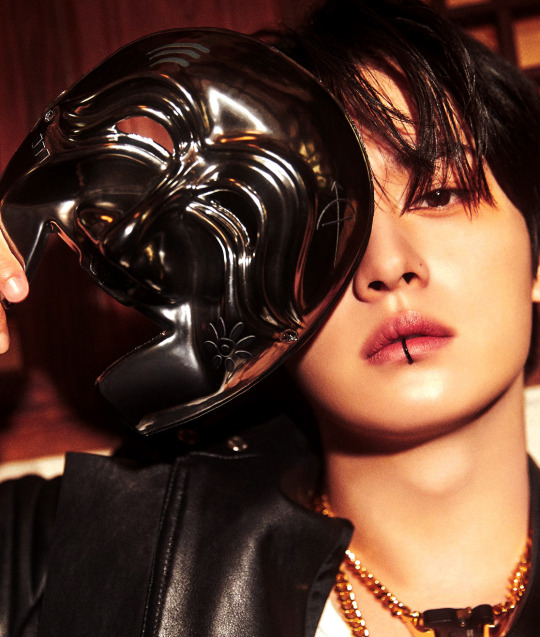
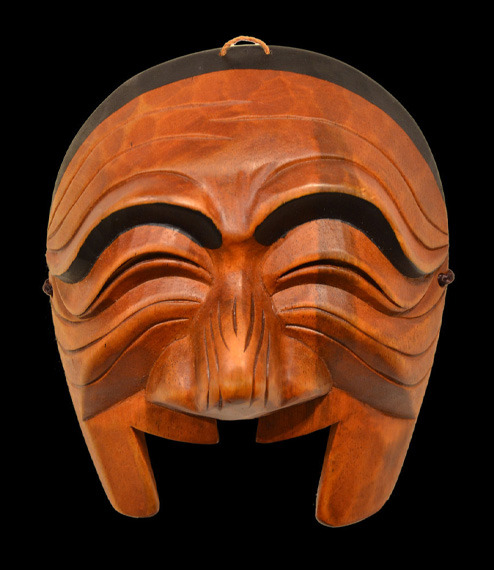
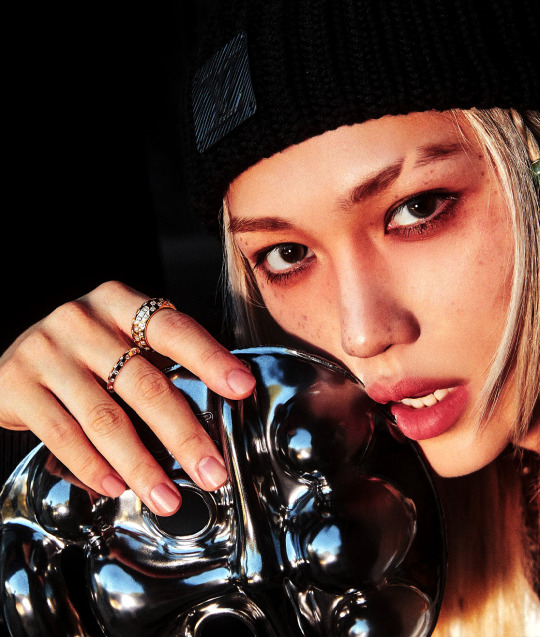
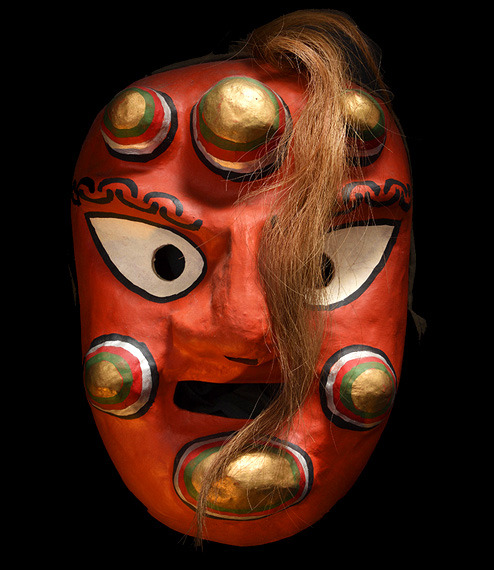
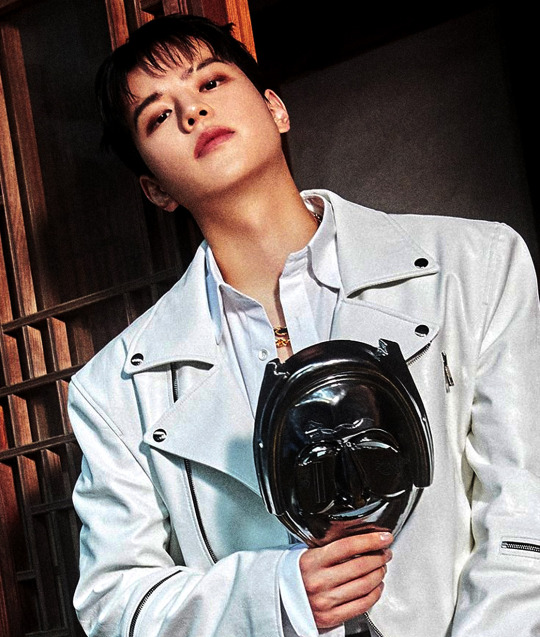
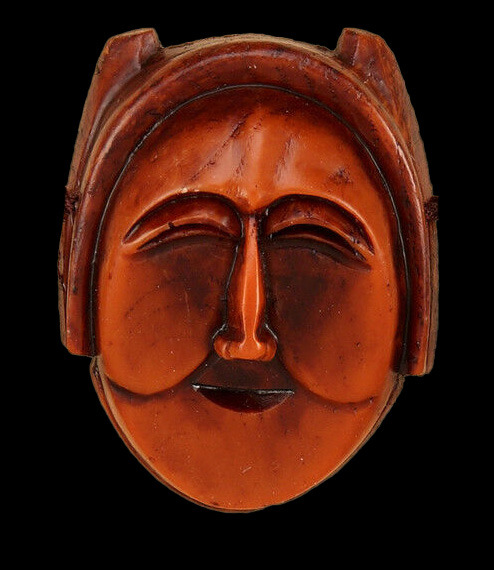
The Nobleman or 양반 (yangban): The smiling face represents the bluff and composure that an aristocrat is often known to have. The chin is a separate piece from the top of the mask, and the actors can lean forward and back to make the mask smile or frown as needed.
This monk who abandons his doctrines, or 취발이 (chwibari): Chwibari was originally a monk, but he had no intention of joining the monastic order, so he came down to the world and wanders. Represented with a forehead full of wrinkles and spots.
The widow or, 부네 (Punae/bune): represented to be a widow, or a kisaeng ( a woman who sang, danced, or played an instrument to provide entertainment for company at a drinking party), or a mistress of the Yangban. She has a very small mouth, round cheeks and forehead- giving a general look of happiness good-humor.
#skz#stray kids#skzedit#bystay#obligatory i am no expert take it with a grain of salt blah blah#theres no changbin bc you cant see the mask clearly and no hyunjin because as best I can figure his mask is a General/high ranking official#but most of those are modern productions and dont have any real descriptions or anything.#these plays were made to mock the upper classes so the nobleman is p much always treated like a fool or bastard lol#also these all change depending on the location- so like the chwibari is usually a negative portrayal of a monk who drinks and parties#and isnt very... monk-ly lets say- but then theres a story where he saves his lover from a lecherous monk and they get married so 🤷♀️#he wasnt a monk that iteration though or he abandoned his studies ?#and then the widow/concubine varies from sympathetic young widow to a kinda femme fatale who seduces the nobleman/scholars#Will any of this play into the concept? probably not. they dont really commit to concepts lbr#but still! it was interesting to look into and the masks are pretty to boot so this was fun :)#it'd be cool if they did a mask dance. i always loved thunderous for the traditional elements so i hope that happens#also YEAH a korean seungmin girl saying she was sad the foreign fans wouldnt get the significance bc she wants to see 'secondary art'#did inspire this (of course i'd wanna know why he was the only one given a womans mask dont act surprised)#bc im pretty sure i know what she means by secondary art and LMAO#i see right through you.... and into myself maybe#long post
134 notes
·
View notes
Text
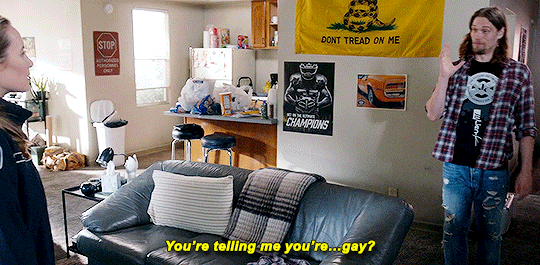
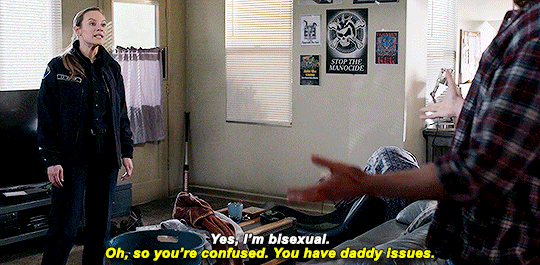
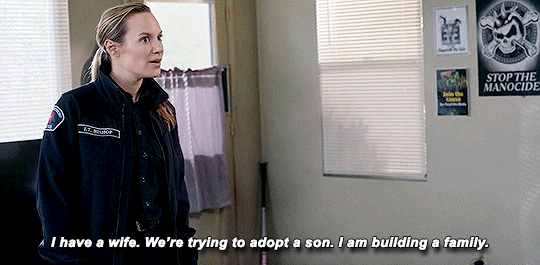
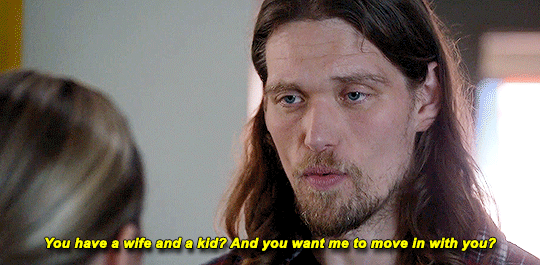
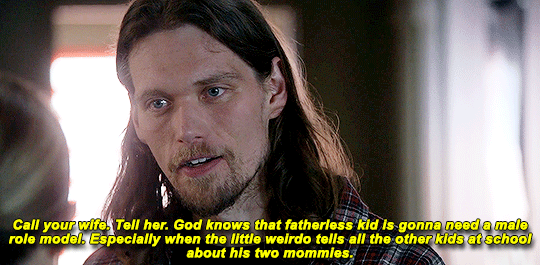
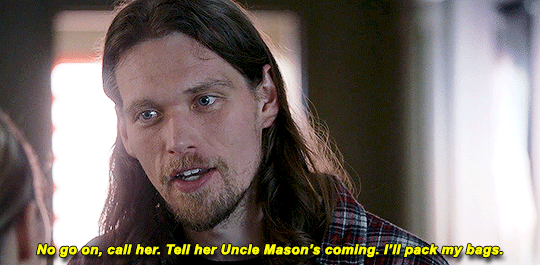
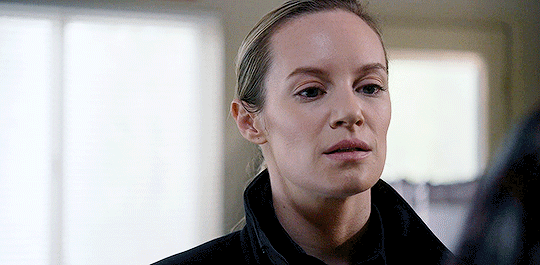
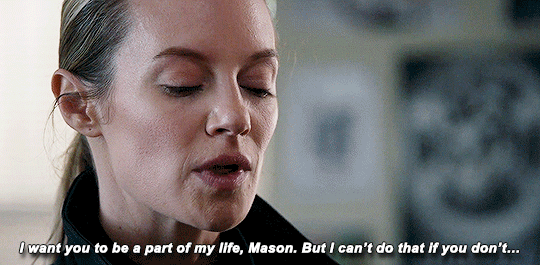
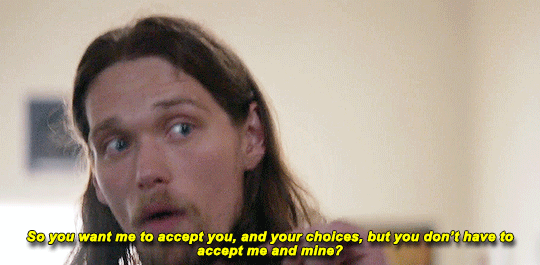
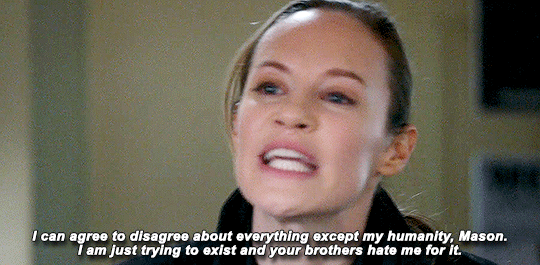
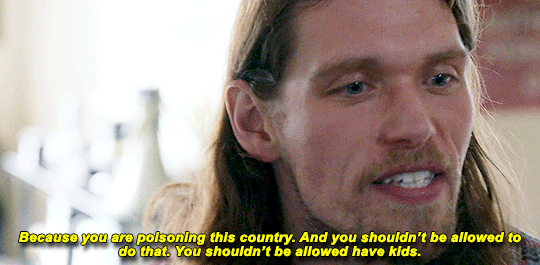
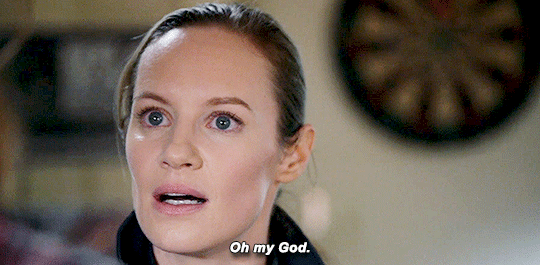
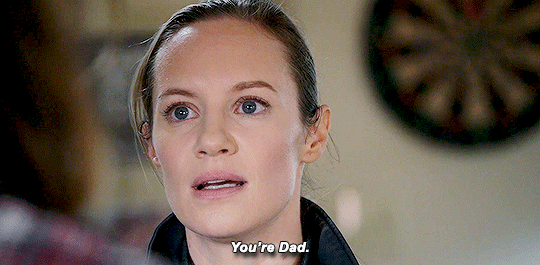
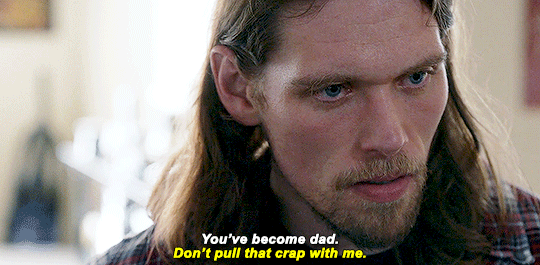
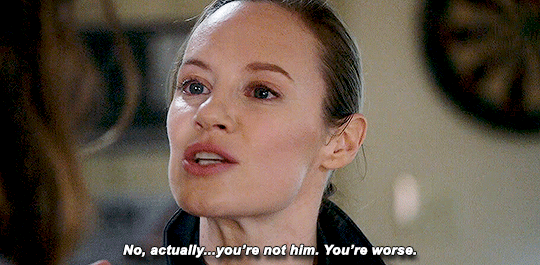
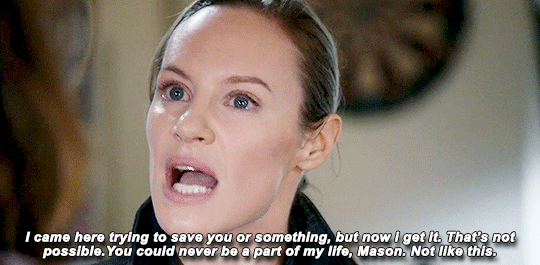
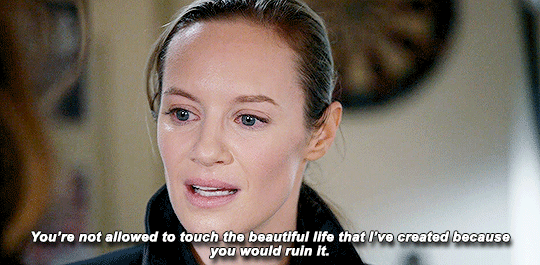
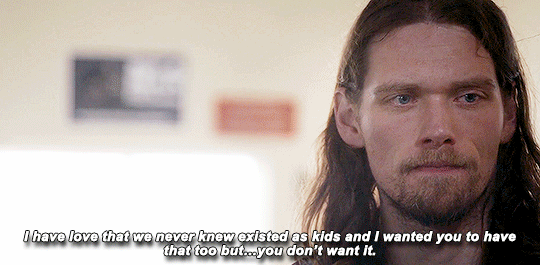
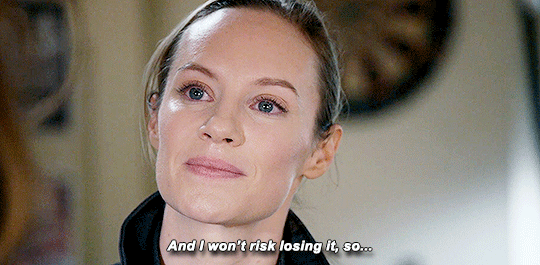
MAYA AND MASON STATION 19: 7x07 'Give It All'
#station 19#station19edit#maya bishop#mason bishop#mine#very long post but the whole scene was too good not to do it in one#danielle absolutely nailed it as expected#i loved her delivery of the 'i have a wife we're adopting a son i'm building a family' line...so good#and her facial expressions as she realizes he's worse than their father...just incredible 👏🏻👏🏻#forever grateful for her portrayal of maya and everything she did with this character
228 notes
·
View notes
Text
if sif's island is still physically there, there could be an argument that the inhabitants are also still there and perfectly fine, and the island is just separated from the outside world. the island's separation from the rest of the world happened while sif was on that boat after running away from home. so in this theoretical situation, from sif's parents' pov, they actually ran away and never came back.
do you think their parents ever wonder what happened to them or what he's doing now. if he's living his life away from them in the outside world, eating all the non-veggies to his content, or if something bad happened and that's why they never came back. do you think they tried to go after him, but forgot everything immediately after leaving the island, and are now just living their lives in vaugarde or somewhere else, not knowing that they got there because they went looking for their missing child or that they had a child in the first place. do you think they ever ran into each other at some point and had no idea of their relation to one another.
#in stars and time#isat#siffrin isat#isat siffrin#there's also the thing that siffrin isn't his birth name. so even if their parents managed to remember they wouldn't have much luck#in terms of finding them because theyre going by a different name so asking around would be useless... there's only the seeing him in perso#it probably wouldn't be hard to find sifs appearance bc his likeness would be like. spread all over bc he was one of the saviors.#but would they even recognize him? I think it would be more likely for his appearance to be spread around as paintings rather than pictures#and there would inevitably be inaccuracies with the portrayal and stuff...#but if they did recognize him. there's still no real easy way to find him bc he's yknow. traveling. and sif themself doesn't remember them#and it's also been so long between when sif ran away and present day post canon. would they even remember what sif looked like back then?#there are so many ways this could go ahhhh.
102 notes
·
View notes
Text
Most people imagine homeric heroes to be hyper masculine and the women as passive characters or whatever, but when you actually read the source material you realize that that’s very very wrong
Reading the odyssey and seeing menelaus cry over his fallen comrades in the war, odysseus sobbing when the bard singing about troy brings back painful memories, yet again he is constantly crying on calypso’s island. Laertes cries, I’m pretty sure the pig herders cry too? There’s just a lot of men crying in that story it’s so interesting to see men being so openly vulnerable
And of course we have a shit ton of incredibly complex and compelling women who all have their own strengths, sorrows, motivations, etc. Helen, clytemnestra, elektra, penelope, cassandra, andromache, circe and so many more are so incredibly diverse and interesting and powerful in their own ways. Whether it be through magic, cunning, physical strength, resilience, their voices, their devotion, etc. Every single one of them are written so well even though people mainly focus on the men in their stories
I’m just using instances from the epic cycle as examples but if we expand it to all of greek mythology there is an infinite amount of examples one could pull from, and I think that’s pretty rad
#I thought about how I was gonna word this for a long time#I was originally gonna joke about how much of men crying there is in the odyssey#then I was like ‘wait… I have Thoughts and Feelings about this’#and then I started thinking about the portrayal of women in myths (I LOVE YOU WOMEN IN GREEK MYTHOLOGY!!!!!!! 💖💖💖💖💖💖💖)#anyways#mind you ancient greece was still a very misogynistic and patriarchal society#but you don’t need me to tell you that#greek mythology#the epic cycle#homeric epics#the odyssey#the iliad#tagamemnon
87 notes
·
View notes
Text
not to come back from the dead here with a hot take but I saw someone say angelic kitty miracle chan implies transitioning is self harm because the MC cuts herself accidentally while shaving, babygirl,,,,, I’ve cut myself hundreds of times shaving that shit is just hard. ALSO cis people cut themselves shaving too, the less experienced anyone is at it the more it will happen, gender aside. you can take ur cinephile metaphor glasses off
#DO NOT REBLOG#also the people saying they refuse to watch it but are shitttttt talking#girl it is 7 minutes long#I’m not asking you to watch one piece over here#I’m just asking you to not shit on someones hard work without even watching#do I adore it and think its amazing and perfect? not really but I think almost all of its flaws lie in the budget#MCs school friend was not a very convincing actor but like#the portrayal of being trans in highschool and using anime to cope is very spot on for me#and the level of detail and the actual animated segments are extremely impressive#so??? suck my butt maybe???
37 notes
·
View notes
Text
i’m going to be honest the real enemy is people who saw a grown adult man using feminine speech/mannerisms and were like oh well that means i have to draw him soooo thin and tiny and waifish. obviously
#1. youre taking away his hotness 2. i dont like what that says about your views of even slightly gnc people#3. guys he’s like 40 years old. also he kills people#i say this like it really matters to me when honestly if art does not appeal to me i just ignore it#him being somewhat muscular would at least make sense. his ass is doing backflips#sorry when i say feminine speech/mannerisms. this depends on different translations#and kind of his symbols and his scrapped role as an alternative to maiden. etc#varréposting#more to say here but it doesnt actually matter at all#EDIT yes it does. to me (avoiding doing my job)#like i love to see people playing off of his femininity in fan portrayals like obviously its hot.#i love to see him in pretty clothes i love to see his beautiful long hair i love seeing him portrayed as nurturing and motherly in mannerism#but if you have to reimagine him as tiny thin weak pale hairless . you are going to die
62 notes
·
View notes
Text

IM NOT THE ONLY PERSON IN MY SOUL
#my art#gotham#gotham 2014#gotham tv#gotham fox#gotham riddler#the riddler#edward nygma#ed nygma#gotham edward nygma#gonna talk abt it a little in the tags...#i just recently accepted i think im plural and am about to see a therapist soon that specializes in dissociation!!#and i know ed and riddler are not . the best portrayal of plurality. but they still bring me a lot of comfort#cause for the majority of the time ive been plural ive assumed my alter was mean or “evil” or at least had bad intentions#and i think both of us find comfort in the stupid evil alter stereotype now#even though i know now thats not the case and its just trying to protect me#yeah sorry for the long tags. hello to anyone reading <3
75 notes
·
View notes
Text
Hawkeye and Frank are the two most diametrically opposed characters on Mash. They clash politically, ideologically, emotionally, intellectually, and even physically on more than one occasion. There is virtually nothing they agree on. But they do have one significant similarity: both Hawkeye and Frank are notably, pointedly effeminate.
Hawkeye is the central protagonist, so he's written to be likeable, even admirable, especially in the first five seasons of the show when satire dominated rather than character drama. He's the character who makes the correct political points and voices the show's ideology, and male audience members are encouraged to identify with him and aspire to be like him. He's witty, he's smart, he's charismatic, he dodges consequences a lot, he's highly skilled in his work, and he has a strong personality and natural leadership qualities.
Frank is the main antagonist up until the end of season five. He's written for audiences to hate him, mock him, and occasionally be horrified by him. He's dull-witted, incompetent, awkward, easily led and manipulated, and always gets his comeuppance. Few audience members are likely to aspire to be more like Frank Burns.
And yet, while most likeable protagonist/detestable antagonist duos in American popular media would also be differentiated in terms of gender performance as a matter of course - the effeminate villain being a standard stock character, always set against a ruggedly masculine hero - Mash takes a different approach.
From his core personality as a sniveling, weak-willed follower, to the way other characters, including Hawkeye, routinely make fun of him by comparing him to a woman or insinuating that he's gay, Frank Burns certainly fits the part of weak, emasculated villain. What's more interesting, and much less commonly seen in Hollywood media, is that Hawkeye is portrayed as just as unmanly, and just as, if not more prone to having it pointed out in the show.
Often Hawkeye's jokes at Frank's expense include the implication that Hawkeye is attracted to him himself, and not necessarily as "the man." He jokes, "Guess it's a marriage, Frank. I know I can do better, but at my age, can I wait?" in Hawkeye, Get Your Gun; he switches from calling Frank one of his vampire brides to taking the feminine part in post-coital pillow talk after siphoning his blood in Germ Warfare; he kisses or tells Frank to kiss him in Major Fred C. Dobbs, For the Good of the Outfit, and Bulletin Board, etc.
Other times, the jokes Hawkeye makes about himself are virtually identical to the jokes made at Frank's expense - their respective attractions to Margaret as a potentially dominant sexual partner, eg, with both Frank and Hawkeye portrayed as eagerly submissive. For instance, in 5 O'Clock Charlie Hawkeye jokes about tying Frank to Margaret's tent, then dismisses the thought with, "He'd probably love it. I know I would." And Hawkeye/Trapper and Frank/Margaret are sometimes paralleled as dual couples, Hawkeye and Frank usually being framed as the more feminine partner in each.
And of course, unconnected to Frank, there are many, many more examples of Hawkeye's effeminacy, both in jokes and in personality traits.
Hawkeye is a self-professed coward who is loud and proud about how terrified he is to be stuck in a war zone. He's emotionally open and highly empathetic, always willing to listen to others' problems and discuss (or scream about) his own. He abhors institutional violence and faces every enemy combatant with his hands firmly in the air. When authority is thrust upon him he strives to relinquish it, and uses it as little as possible.
More shallowly, he has little interest in sports and exercise, derides masculine hobby magazines like Field and Stream and Popular Mechanics, is incapable of performing mechanical tasks to the exasperation of others at least four times (Comrades in Arms which explicitly frames this emasculating, In Love and War, Patent 4077, and Hey, Look Me Over), mocks traditional masculinity in many ways, and enjoys musical theatre and Hollywood gossip. And he makes and takes literally hundreds of jokes about being unmanly and having sex with men himself, many more than he makes at Frank's expense.
But while the jokes are at Frank's expense and meant to belittle him, they're rarely made at Hawkeye's expense, especially in the first five seasons. Hawkeye doesn't make the jokes out of self-deprecation, he makes them out of pride and a desire to differentiate himself from the army men he's surrounded by. He's almost always in on the jokes others make about him, rather than offended - Potter telling him to file a paternity suit against his rival in Hepatitis makes him laugh delightedly, and Trapper's remarks on his effeminacy, such as Miz Hawkeye in Hot Lips and Empty Arms, are sometimes lightly teasing but always a regular aspect of their dynamic that Hawkeye enjoys playing up. Frank doesn't make any jokes directly mocking Hawkeye's masculinity that I can recall, beyond vague "pervert" and "degenerate" remarks, which, while often historically homophobic, in the show's context tend to be treated as a reference to his heterosexual endeavours.
Frank's effeminacy is a point of mockery and derision, but Hawkeye's is a point of pride, and not intended to make him any less likeable to an audience. Antagonists don't get to score points off of Hawkeye by mocking his feminine traits, but Hawkeye makes fun of Frank regularly by mocking his feminine traits.
This difference in framing can partially be explained by the nature of their respective gender performances.
While Hawkeye and Frank are both effeminate, they're effeminate in many opposite ways. Frank is weak-willed while Hawkeye is strong-willed. Frank is unappealing to most women, while Hawkeye is something of a lady's man. Frank cannot face his fears to rise to a challenge, but Hawkeye can. But on the flipside, Frank refuses to admit to fear while Hawkeye openly proclaims it. Frank strives to attain authority while Hawkeye refuses it or takes it on only begrudgingly. Frank is obsessed with guns to a freudian extent while one of Hawkeye's most famous monologues of the show is a speech about refusing to carry one. Frank worships the concept of traditional masculinity even while he can't perform it himself, while Hawkeye mocks the concept and would refuse to perform it even if he could.
The Sniper is an excellent case study of these contrasts. In this episode, Hawkeye is effeminate and at ease with it, while Frank is desperate to prove himself masculine. Frank and Margaret flirt with strong Freudian overtones while Frank shoots a gun while nearby Hawkeye flirts with with a nurse with a line about "tasting" her. Hawkeye connects with the nurse he's wooing by relating to how scared she is and huddling in fear with her, while Margaret demands that Frank prove his masculinity by going out and taking down the sniper himself. Frank carries a gun while trying to approach the sniper, while Hawkeye carries a white flag. Frank tries to make fun of Hawkeye for wanting to surrender, but he can't bring himself to approach the sniper while Hawkeye does.
This contrast of gender performance is a consistent aspect of Hawkeye and Frank's dynamic throughout the show, but The Sniper makes it a central theme so it's a useful example to show how their relationships to masculinity are a deliberate aspect of their dynamic.
And while Hawkeye makes fun of Frank's femininity, it's significant that he also regularly makes fun of Frank's masculinity - his love of guns (eg The Sniper), his sexual affairs (eg the exchange about Frank as a "fantastic performer" in Yankee Doodle Doctor), his numerous attempts to exert authority (eg Welcome to Korea), his desire for socially approved success (eg Hot Lips and Empty Arms), etc.
Both masculine and feminine sides of Frank are comprised of negative character traits, while Hawkeye embodies the best of both - emotional expression and healthy ways of coping by talking about his feelings; bravery but not machismo; intelligence and skill as a doctor rather than an officer; empathy and a willingness to listen; sexual prowess but largely through his love of foreplay rather than his dick game (which, in the context of the early 70s, is a somewhat feminine attribute that distinguishes him from a typical traditionally masculine man); etc.
Hawkeye demonstrates some of the most appealing and healthy qualities of both masculinity and femininity while Frank demonstrates, or strives to demonstrate, the more toxic qualities of both. Through including a few positive masculine traits in the mix, the narrative is able to depict Hawkeye as likeable, admirable, and desirable in his effeminacy while Frank is depicted as loathesome in his. Hawkeye gets one of many, many women in The Sniper by showing vulnerability, while Frank only appeals to Margaret, and Margaret is portrayed as borderline pathological in her sexual attraction to violent masculinity (the scene where Frank excites her with his gun, for example, also includes an electra complex joke, and there's a running rape kink gag in this episode as well).
Another aspect to consider when it comes to differentiating Hawkeye and Frank's respective femininities is hypocrisy. Similar to how Frank and Margaret's affair is mocked because they can't admit to it while Hawkeye and Trapper's affairs are glorified, part of what makes Frank's effeminacy so mock-worthy, while Hawkeye's feminine qualities are a source of pride and rebellion, is that Frank refuses to admit to them.
Frank desperately wants to be the ideal heroic army man and often play-acts the part, poorly. When Hawkeye mocks him by calling him a woman, for example, he's drawing attention to Frank's failure to live up to his own ideals. And when Hawkeye calls himself a woman, he's mocking those same ideals. The message is that Frank is pathetic not so much for failing to be traditionally masculine, but for wanting to be traditionally masculine at all.
Ultimately the ways Hawkeye and Frank perform masculinity and femininity are pointedly in opposition, from which masc and fem traits they embody, to how proudly they embody them. The show itself draws attention to these gendered similarities and differences between Frank and Hawkeye through a constant barrage of jokes, and even whole scenes and episodes. In this way the show portrays Frank as a hypocritical loser who wants to be masculine but fails to embody all but the worst traits, and Hawkeye as a cool, admirable guy who disdains the traditional pillars of masculinity and embraces his own effeminacy.
#mash#marley on mash#mash gen#mash gs#frank mash#hawkeye mash#since you guys liked that trapper gender meta a lot more than i thought you would here have another one#though this is written a little less formally lol#i have more examples of whole scenes that make these comparisons than just the sniper but i'm trying to keep this from being#even longer than it already is#but eg white gold is another good example wrt how they relate to flagg; yankee doodle doctor; army navy game; george; the gun; etc etc#(also it's interesting that when frank leaves hawkeye gets the pathetic loser portrayal more often... though i think that's a coincidence#the shift from early to late mash could be yet another essay on mash and gender lol)#long post
300 notes
·
View notes
Text
My favourite part of Dick Grayson as a character is that he is never afraid of Bruce.
Like, Jason has his fear of disappointing him, Tim is a bit intimidated and has his hero worship, Damian fears that Bruce’ll kick him out the way he thinks Talia did, but Dick?
Dick is so unconcerned about Bruce at every possible moment. Even the earliest comics had Dick calling Bruce lame to his face. Dick works with Bruce and his partner for years and they understand each other on a deep level and Dick multiple times calls Bruce a fucking square.
Dick does not tell Bruce anything. He does not write home. If Bruce wasn’t in the room with him when Dick got called to go somewhere, I’m pretty sure Dick would not have informed Bruce that he was even leaving, let alone where he was going. The Teen Titans joined the Peace Corps, they were in Washington for at least a few days being trained, and Bruce finds out that Robin joined the Peace Corps from a newspaper. Dick does not tell him anything.
Dick and Bruce have such a fascinating relationship to me because Dick really doesn’t treat Bruce as his dad so much as he treats him like a particularly obnoxious older brother. Bruce treats Dick like his little baby bird who he cares about and doesn’t want to get hurt, but Dick is over there like “ugh, Bruce is so overdramatic” while he nearly drowns for the fifth time.
In early Teen Titans, there’s no question that Robin is physically the weakest member. Aqualad and Wonder Girl both have super strength, Kid Flash’s speed means that he doesn’t need super strength, but Robin is by far the easiest to capture. He gets caught very consistently through the early issues, albeit people can only catch him if they take him off guard, but it’s a lot easier to catch him off guard in early comics. Robin is the brains of the group, the others look to him for direction and depend on him to make plans that will work and panic when Robin gets nabbed because what will they do without Robin??
Robin gets captured a lot in early Batman comics too. Robin is the ultimate damsel, but he’s never really in very much distress? Like, Bruce and the Teen Titans are distressed, but Robin just looks maybe a bit surprised and bored. Robin never seems to take his own mortality into account when he does things, meanwhile literally everyone else does.
Dick only ever really gets annoyed with Bruce. He bever gets mad at his teammates, even when they question his ability. For the most part, Dick doesn’t even respond when they underestimate him to his face. I have no idea what’s going on in Dick’s head, but he isn’t a part of Aqualad and Kid Flash finding each other and him annoying in their first team ups and he never gets upset when they don’t believe in him.
Then, on the other hand, Bruce calls the music Dick is listening to noise, and Dick immediately is annoyed. Dick and Bruce having a turbulent relationship is more apparent later on in the comics, but Bruce is truly the only one in all the galaxies who gets under Dick’s skin as much as he does.
And it’s funny because fandom likes to paint Dick as bitter that Bruce didn’t adopt him, while I think Dick would have blown his top if Bruce even tried to adopt him. Dick had parents, he never views Bruce as a parental figure. Don’t get me wrong, Dick loves Bruce. Bruce does so much for Dick and Bruce is protective of him and Bruce is open about his affection, but Dick just doesn’t view him as his father.
I really think Dick views Bruce as more like a guard dog than a father. He talks so casually to Bruce, but he’s more formal to other adults. He complains about Bruce not trusting him, but doesn’t care when his teammates don’t trust him either. He views the rich billionaire vigilante who can take down a god in a fight as fucking lame.
Their relationship is amazing. They get along great. They’re a perfect duo, they work in tandem, they’re absolutely unstoppable together. If Bruce talks too much Dick will roll his eyes. They trust each other with their life. Dick is never telling Bruce anything. Bruce says “I guess I can spare Robin for a minute” and Dick is like “I would be perfectly content to never return home for the rest of my days.”
Of all the Robins, Dick is absolutely the one who respects Bruce the least. He loves the guy, but he just canNOT take him seriously.
(Do you think it was the time Bruce sent a box of bats to someone? Or the times Bruce gets captured and has to be rescued by his damsel side-kick? Or the way Bruce is like an overprotective mother, coming this close to reminding Robin to wash behind his ears? Or the way Bruce lets Robin say whatever he wants and never gets upset or offended or even hurt?
Or, maybe, Batman tripped on his cape once, and Dick just can never forget.)
#the inane ramblings of a madman#dc#dc comics#batman#teen titans#dick grayson#robin#batman and robin#bruce wayne#dick is the very picture of a saint when with his friends#he is patient and understanding and he listens to them and he cares about them#he worries about his friends before worrying about the criminals#but the moment he is in any proximity to bruce#it all comes crumbling down#he is so done#the dynamic duo is truly just#so dynamic#and i’m aware that their relationship is portrayed differently throughout the years#this is just my favourite portrayal#dick is so calm and patient but if bruce looks at hom for too long he will mcfucking lose it#long post#character analysis
1K notes
·
View notes